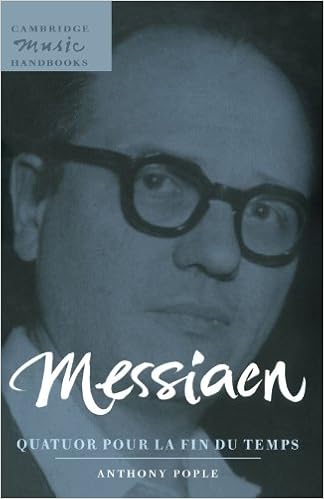
Free Messiaen: Quatuor Pour La Fin Du Temps (Cambridge Music Handbooks) Ebooks To Download

This book is about one musical work, the popular Quartet for the End of Time by the great French composer Olivier Messiaen. Like virtually all of his works, the Quartet combines the striking technical achievement of Messiaen's rich and attractive musical style with a deeply felt theological inspiration. Anthony Pople's book provides an introduction to Messiaen's style through an examination of this great work, showing how it came to be composed while Messiaen was a prisoner-of-war and premiered under extraordinary conditions in Stalag VIIIA in 1941. He gives an in-depth assessment of each of its eight movements.

Series: Cambridge Music Handbooks
Paperback: 128 pages
Publisher: Cambridge University Press (August 13, 1998)
Language: English
ISBN-10: 0521585384
ISBN-13: 978-0521585385
Product Dimensions: 5.4 x 0.3 x 8.5 inches
Shipping Weight: 7.8 ounces (View shipping rates and policies)
Average Customer Review: 4.5 out of 5 stars See all reviews (2 customer reviews)
Best Sellers Rank: #1,736,041 in Books (See Top 100 in Books) #298 in Books > Arts & Photography > Music > Musical Genres > Classical > Chamber Music #2640 in Books > Arts & Photography > Music > Theory, Composition & Performance > Techniques #3419 in Books > Textbooks > Humanities > Performing Arts > Music

Olivier Messiaen's Quatuor pour la Fin du Temps is, in many ways, a textbook example of all of the techniques he had consolidated up until 1941 (and is still a characteristic "textbook" up until 1950). This explains the profusion of examples from this work that find their way into Messiaen's literal textbook dating from this period, Technique de mon langage musical.Considering this, Anthony Pople's handbook on Quatuor pour la Fin du Temps is an excellent entry into the world of Messiaen. Pople amply extracts the most prevalent techniques in this music directly from Technique de mon langage musical (A publication relatively hard to find outside of the university or conservatory library), and elaborates on them.Due to the length and space (as well as the presumed targeted audience) provided for Cambridge Handbooks, some of the analysis is rather glossed over: the rhythmic and harmonic pedals in 'Liturgie de cristal', for example, do indeed have variation, contrary to Pople's explanation of these cycles. To Pople's credit, he points out one of the instances of this in the rhythmic pedal of the cello.As this may only occur in the first printing of this book, the following may be excused if it has been corrected in subsequent editions. In the Appendix that cites the modes of limited transposition, there is a mistake in the example of Mode 7. The correct version in C transposition is C, Db, D natural, Eb, F, F#, G, Ab, A natural, B (enharmonically spelled). Although this may seem like nitpicking, The suggestion will surely be helpful to the frustrated student trying to realize the 6 proper transpositions to no avail. This is obviously a misprint, as Anthony Pople correctly cites the mode in his paper "Messiaen's Musical Language: An Introduction", in The Messiaen Companion.Overall, this is a wise place to start in any study or appreciation of Olivier Messiaen's music, and Anthony Pople should be commended for this exceptional work.
Anthony Pople's work on Olivier Messiaen's war-time masterpiece "Quatuor pour la fin du temps" is, like all entries in the Cambridge Music Handbooks series, a rigorous musicological examination.The introduction of the work gives some background on Messiaen, speaking about his life and earlier works (useful for understanding where some of the material of the fifth movement came from). The the Quatuor's creation, within the Stalag prisoner-of-war camp in Nazi Germany, is legendary and receives some discussion here, although those hoping for even more information on the setting should turn to Rebecca Rishin's "For the End of Time: The Story of the Messiaen Quartet" (Cornell University Press, 2003).Each of the eight movements of the Quatuor has its own chapter, and the analysis differs based on the special properties of each. For example, form and colour are the focus of the second movement ("Vocalise..."), while birdsong is the major topic of the third ("Abime des oiseaux"). The quartet was written as Messiaen was conducting the experiments that led to his early book "Technique", and Pople carefully charts the innovations of rhythm and pitch that Messiaen was developing at this time. As with all entries in the CMH series, quotations from the score abound.If you have some musical training, Pople's book will vastly expand your appreciation of the "Quatuor". I went from thinking it a juvenille work compared to "Des canyons aux etoiles" or "Eclairs sur l'aux-dela" to seeing it as a piece of marvellous ingenuity.
Messiaen: Quatuor pour la fin du temps (Cambridge Music Handbooks) The Cambridge Companion to Jewish Music (Cambridge Companions to Music) For the End of Time: The Story of the Messiaen Quartet Trésors du temps, Student Edition [Niveau Avancé] Brahms: A German Requiem (Cambridge Music Handbooks) The Early Clarinet: A Practical Guide (Cambridge Handbooks to the Historical Performance of Music) The Cambridge Companion to Percussion (Cambridge Companions to Music) The Cambridge Companion to the String Quartet (Cambridge Companions to Music) The Cambridge Companion to Ballet (Cambridge Companions to Music) The Schenker Project: Culture, Race, and Music Theory in Fin-de-si?cle Vienna Smithsonian Handbooks: Rocks & Minerals (Smithsonian Handbooks) Smithsonian Handbooks: Reptiles and Amphibians (Smithsonian Handbooks) Smithsonian Handbooks: Birds of Florida (Smithsonian Handbooks) How to Finance a Marijuana Business: Cannabis Meets Crowdfunding: Private Placement Handbooks & Cannabis Commerce Handbooks, Book 3 Cambridge IGCSE® Business Studies Coursebook with CD-ROM (Cambridge International IGCSE) The Cambridge Companion to Greek Tragedy (Cambridge Companions to Literature) The Cambridge Companion to the Modern Gothic (Cambridge Companions to Literature) The Cambridge Companion to Renaissance Humanism (Cambridge Companions to Literature) The Cambridge Companion to Victorian Women's Writing (Cambridge Companions to Literature) The Cambridge Companion to Modern Spanish Culture (Cambridge Companions to Culture)



